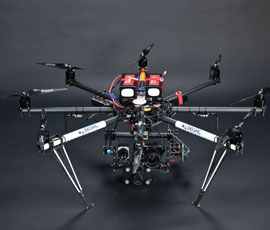Rothamsted unveils octocopter crop-monitoring drone

Rothamsted Research is investing in unmanned aerial vehicle (UAV) technology to monitor crops and crop experiments as part of its genetic improvement projects.
The research centre, based in Hertfordshire, has obtained the high performance radio remote-controlled “Octocopter” drone equipped with four distinct cameras.
The custom-built equipment will enable data collection from experimental crop plots at each of the institute’s UK sites as well as at trial sites by collaborating organisations.
Collection of data with this method will give unique perspectives on crop growth and plant functioning. It will vastly extend capabilities for screening crops of different genetic background for performance, nutrition, stress, pathogen and disease responses.
The UAV, which was funded by a £25,000 grant from the Biotechnology and Biological Sciences Research Council (BBSRC), is powered by a standard 8 rotor battery powered unmanned aerial vehicle, as typically used in the film industry.
This is the first time a UK agricultural research organisation has obtained an UAV equipped to this standard.
Four cameras have been added, two of which can give a live feed of their picture to a monitor on the ground. One camera, which can take videos and stills is on a fixed mounting, pointing forwards, and is used to identify where the camera is flying, via goggles.
The other three cameras are all mounted on a stabilised platform which can be tilted remotely from the transmitter, and comprise a high definition RGB camera, a thermal infra-red camera and a hyperspectral camera.
It is anticipated that several thousand plots will be monitored in projects currently screening germplasm variation amongst thousands of lines combined with multiple treatments and replications.
Dr Malcolm Hawkesford, lead scientist of the 20:20 Wheat Programme at Rothamsted Research, said: “We are very excited to have been able with the support of the BBSRC to obtain this unique equipment.
“The UAV will be deployed over the full range of crops studied at the institute and will enable detailed evaluations of growth and functioning of the plants.
“It will enable multiple measurements to be made within a short space of time with pre-programmed low level flight paths.”
Prof Maurice Moloney, Rothamsted’s director and chief executive, added: “The technology will substantially increase throughput and precision of analysis, and make a substantial contribution to current programmes of crop improvement including 20:20 Wheat, Cropping Carbon, Sustainable Systems and the cross institute Wheat Improvement Strategic Programme (WISP) project.
“The technology will compliment ground-based measurements initially but eventually aerial-based observation will replace the need for low throughput non-automated manual measurement.”
Read the latest news on crop condition on our CropWatch site
genetic improvement projects.
